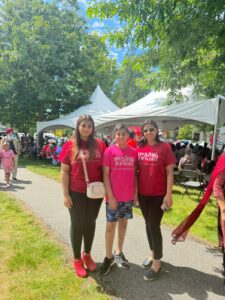 In Conversation with Namita Kandhola
In Conversation with Namita Kandhola
Mental health awareness is a critical global issue, but its importance is unique in the South Asian Community. Cultural stigmas, lack of mental health resources, and deeply rooted societal norms contribute to a significant gap in addressing mental health needs in this demographic. While the global conversation surrounding mental health has progressed in recent years, South Asian communities continue to face challenges in both understanding and addressing mental health issues. Raising awareness within these communities is vital to promoting well-being, breaking down barriers, and fostering open conversations about mental health.
Namita Kandhola is a Registered Clinical Counsellor with over 10 years of experience in this field. She runs a private practice and works with a non-profit organization Moving Forward Family Services. She offers a range of culturally sensitive services designed to support the unique challenges faced by her clients. She creates a safe space to encourage individuals and families to seek help without the fear of judgment.
“In my counselling practice, I often encounter clients who express concerns about how their mental health struggles might affect their family’s standing within the community. They feel ashamed to disclose their feelings, even to those closest to them. This culture of silence prevents open discussions, delaying diagnosis and treatment,” Namita explains.
 In the South Asian culture, the family unit is central to an individual’s life, providing emotional and social support. However, it can also act as a barrier when mental health issues arise. In many cases, family members may discourage someone from seeking professional help, suggesting that emotional distress can be managed internally or through spiritual means. One example comes from Namita’s client, a 30-year-old woman suffering from anxiety and depression after a divorce. Initially, her family discouraged her from seeking therapy, believing that the issue could be resolved through traditional practices and family support. However, after months of emotional struggle, the woman sought professional help, which ultimately led to her recovery and stronger family relationships.
In the South Asian culture, the family unit is central to an individual’s life, providing emotional and social support. However, it can also act as a barrier when mental health issues arise. In many cases, family members may discourage someone from seeking professional help, suggesting that emotional distress can be managed internally or through spiritual means. One example comes from Namita’s client, a 30-year-old woman suffering from anxiety and depression after a divorce. Initially, her family discouraged her from seeking therapy, believing that the issue could be resolved through traditional practices and family support. However, after months of emotional struggle, the woman sought professional help, which ultimately led to her recovery and stronger family relationships.
Namita suggests that it is critical that family members understand mental health conditions that require attention. “Educating the family about the signs and symptoms of mental health issues can help foster a more supportive environment, encouraging individuals to seek appropriate care,” she says. She adds that while family support is essential, it is equally important to recognize when professional mental health care is necessary.
One crucial aspect of Namita’s approach is understanding that South Asian communities are not monolithic. While some families may be more open to discussing mental health, others may be deeply entrenched in traditional beliefs that prevent such conversations. For example, within Punjabi, Bengali, Tamil, and other South Asian subcultures, there are varying degrees of acceptance regarding mental health care. Recognizing these differences is key to providing culturally sensitive treatment that addresses the diverse experiences of the South Asian community.
Raising awareness about mental health in the South Asian community requires a concerted effort from both mental health professionals and community leaders. Namita closely works with Moving Forward Family Services, a non-profit organization that offers free short-term and affordable long-term counselling. The organization runs outreach programs to educate individuals and communities about mental health issues, coping strategies, and available resources. Namita, along with her daughter and son, volunteer for these outreach programs. She believes that involving kids in volunteering for mental health programs can help them develop empathy and awareness from a young age, thereby normalizing conversations about mental health, reducing stigma and making a meaningful contribution to the society
Namita shares the story of a family who was initially resistant to the idea of therapy for their teenage son, who was battling severe social anxiety. Through the outreach programs, they learned about the benefits of therapy and gradually became more open to professional help. Over time, the son received therapy, which significantly improved his mental health and communication with his family. The family now actively advocates for mental health awareness in their community.
As a counsellor, Namita’s goal is to create a safe space where individuals from the South Asian community feel comfortable discussing their mental health without the fear of judgment. “By recognizing the cultural factors that shape their experiences, I strive to bridge the gap between traditional values and modern mental health care. However, true progress requires community-wide efforts to raise awareness, dismantle the stigma, and create supportive environments where individuals can seek the help they need. Through open dialogue, education, and culturally competent care, we can begin to break the cycle of silence and shame that surrounds mental health in the South Asian community. I hope that, over time, mental health care will be viewed as an essential aspect of overall well-being, not something to be hidden or ignored,” she says.

Namita Kandhola is a Registered Clinical Counsellor
with the BC Association of Clinical Counsellors. She has
a Master’s degree in Counselling Psychology from
Adler University and runs a private practice called
Namita Kandhola’s Counselling Services. With over 10
years of experience, Namita practices from a trauma-
informed lens to provide a safe and empathetic space
for her clients throughout their journey of self-
empowerment and self-discovery. She works with
adolescents and adults, and the therapy she offers
helps alleviate painful experiences like depression,
anxiety, trauma, loneliness, grief, and loss, and
relationship issues. She applies a diverse and holistic
approach to treatment by dedicating time to learning
and understanding all aspects of a person’s life. She
has specialized training in Cognitive Behavioral
Therapy and Mindfulness-Based Somatic Therapy.








